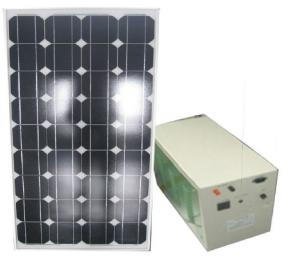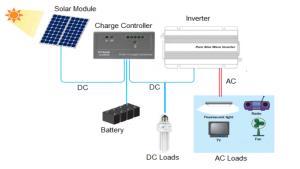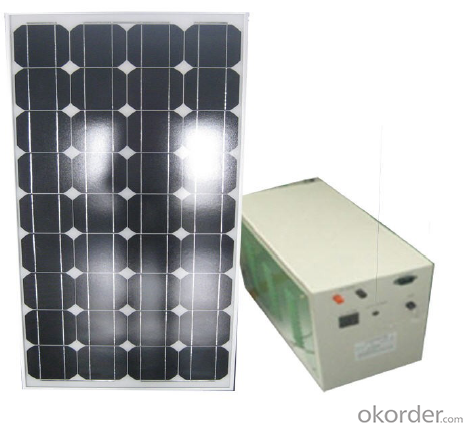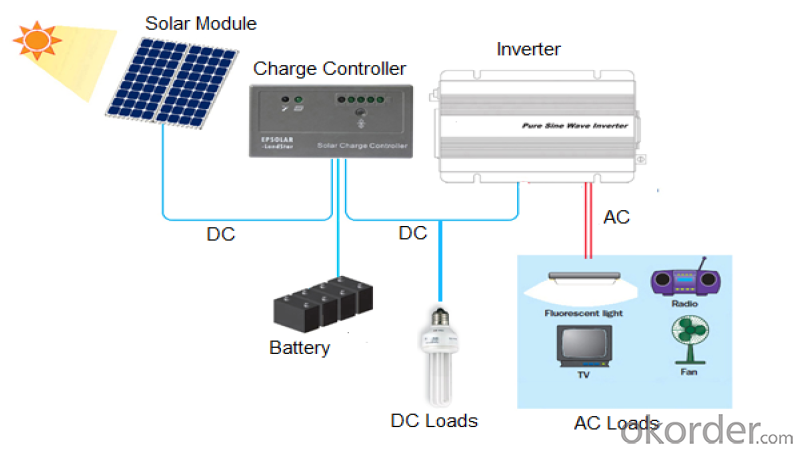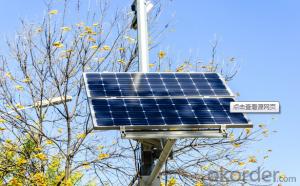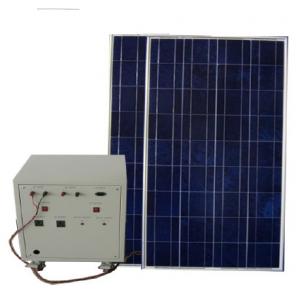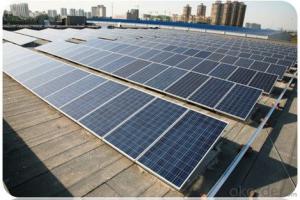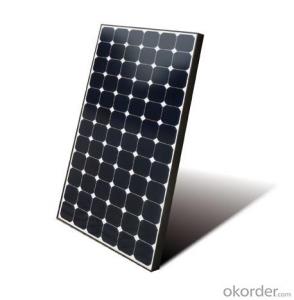Grants for Solar Energy Systems:CNBM-K2 80W Solar Home System with Good Quality
- Loading Port:
- China main port
- Payment Terms:
- TT or LC
- Min Order Qty:
- 1 pc
- Supply Capability:
- 1000000000 pc/month
OKorder Service Pledge
OKorder Financial Service
You Might Also Like
CNBM SOLAR is a world-leading and Vertical integrated manufacturer of high-performance with Silicon, Wafer, Cells, Modules, which convert sunlight into electricity for residential, commercial, and utility-scale power generation.
The capacity of CNBM SOLAR is reach to 1GW, and make sure each year our shipment capacity is more than 700-800MWs, at the same time, we have set up the largest solar power station with our partner in Ukraine.
CNBM is a Quality + Service oriented company with“Excellence at Each Step” approach, composed of the finest components from TUV and IEC-certified partners around the world, CNBM modules consistently undergo a variety of trials at the company’s Test & Development Centre, ensuring peak performance capabilities.
The company is committed to develop and provide the world with clean and renewable energy to ease the energy shortages as well as human kind’s impact on the environment.
Data:
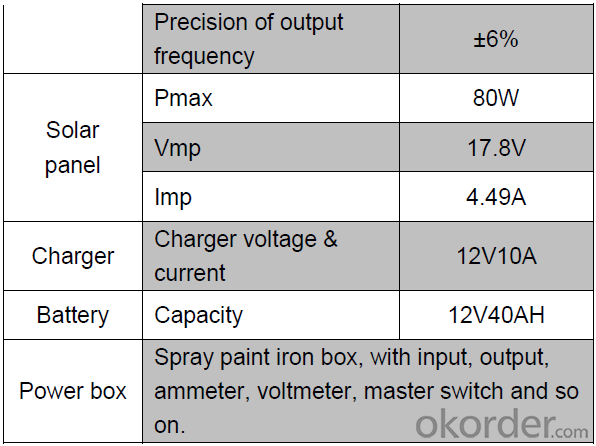
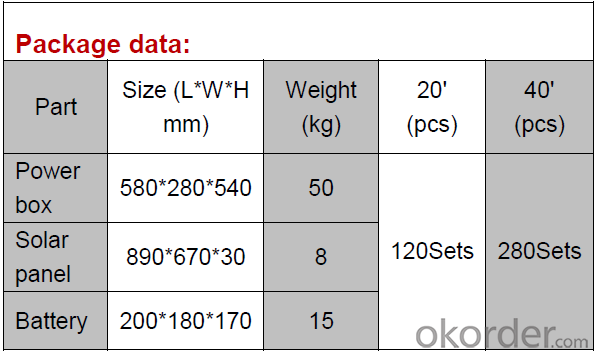
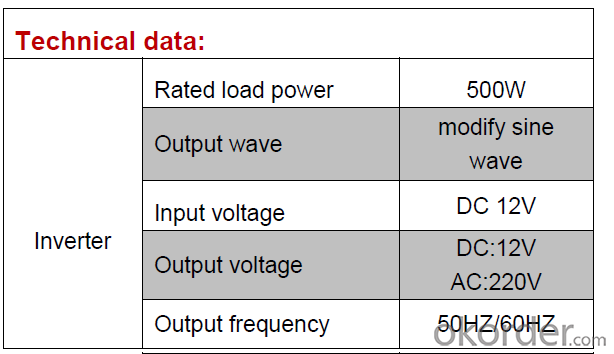
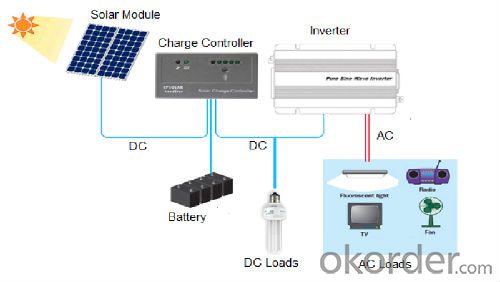
FAQ:
Could you pls introduce more about CNBM?
CNBM Group is short for China National Building Materials Group Corporation, which is established in 1984 with approval from the State Council
CNBM Group is the largest comprehensive building materials industry group in China
The Group has a total asset of over RMB 360 billion, more than 180,000 employees and 17 subsidiaries
- Q: How do solar energy systems impact the reliability of the electricity grid?
- Solar energy systems can have both positive and negative impacts on the reliability of the electricity grid. On one hand, solar energy systems can enhance grid reliability by diversifying the energy sources and reducing reliance on traditional fossil fuel-based power plants. This can help prevent power outages and reduce the vulnerability of the grid to disruptions. Additionally, solar energy systems can contribute to the decentralization of power generation, empowering communities and reducing the risk of widespread blackouts. On the other hand, solar energy systems also pose challenges to grid reliability. Their intermittent nature, as solar power generation depends on sunlight availability, can create fluctuations in the supply of electricity. This intermittency requires the grid to be more flexible and adapt quickly to varying solar output. To ensure grid stability, additional measures such as energy storage systems and advanced grid management technologies may be necessary. Overall, the impact of solar energy systems on grid reliability depends on various factors such as the level of solar penetration, grid infrastructure, and the implementation of supportive policies and technologies. With proper planning and integration, solar energy systems can contribute to a more reliable and resilient electricity grid.
- Q: Can solar energy systems be used for powering off-grid eco-sanctuaries?
- Yes, solar energy systems can definitely be used for powering off-grid eco-sanctuaries. In fact, they are an ideal solution for such locations as they provide a sustainable and renewable energy source. Solar panels can generate electricity during the day, and excess energy can be stored in batteries for use at night or during cloudy periods. This not only reduces reliance on traditional power sources but also helps to minimize the environmental impact of these sanctuaries by reducing carbon emissions.
- Q: Can a solar energy system be installed in a residential community with homeowners' association rules?
- Yes, a solar energy system can be installed in a residential community with homeowners' association rules. However, it is important to review the specific guidelines and regulations set by the homeowners' association (HOA) regarding the installation of solar panels. Some HOAs may have certain restrictions or requirements in terms of the design, location, and appearance of the solar panels to maintain the aesthetic appeal of the community. It is advisable to consult with the HOA board and possibly seek their approval before proceeding with the installation.
- Q: What is a solar inverter and what does it do?
- A solar inverter is an essential component of a solar power system. Its main function is to convert the direct current (DC) electricity generated by solar panels into alternating current (AC) electricity, which is the type of electricity used in homes and businesses. Solar panels produce DC electricity when sunlight hits the photovoltaic cells, creating an electric charge. However, most household appliances and the power grid operate on AC electricity. Therefore, a solar inverter is necessary to convert the DC power from the solar panels into AC power that can be used to power household appliances or fed back into the grid. Apart from converting the electricity, solar inverters also perform other important functions. They regulate the voltage and current levels to ensure that the electricity being produced is safe and compatible with the electrical devices. Additionally, solar inverters also provide a mechanism called Maximum Power Point Tracking (MPPT) to optimize the energy output of the solar panels. MPPT adjusts the operating voltage and current of the solar panels to extract the maximum power under varying weather and shading conditions. Furthermore, solar inverters have built-in safety features that protect the system and the electrical grid. They monitor the flow of electricity and shut down the system in case of a fault, such as a short circuit or grid outage, to prevent any damage or injury. In summary, a solar inverter is an integral part of a solar power system as it converts the DC electricity generated by solar panels into AC electricity that can be used to power homes, businesses, and the electrical grid. It also ensures the safe and efficient operation of the system by regulating voltage and current, optimizing energy output, and providing protection against faults.
- Q: Can solar panels be used in military operations or remote military outposts?
- Yes, solar panels can be used in military operations or remote military outposts. Solar panels provide a reliable and sustainable source of energy that can help meet the power demands of military installations, especially in remote locations where access to traditional power sources may be limited or unreliable. Solar panels can supply electricity for various applications, including powering communication systems, surveillance equipment, lighting, and charging batteries, making them a viable solution for the military's energy needs. Additionally, their low maintenance requirements and ability to be deployed quickly make them suitable for military operations and outposts.
- Q: What is the role of power optimizers in solar energy systems?
- The role of power optimizers in solar energy systems is to maximize the energy harvest from each individual solar panel by performing module-level optimization. Power optimizers track the maximum power point of each panel, ensuring that it operates at its highest efficiency regardless of shading or panel mismatch. This improves the overall performance and reliability of the solar energy system, leading to increased energy production and higher return on investment.
- Q: What is the lifespan of a solar energy system?
- The lifespan of a solar energy system typically ranges from 25 to 30 years.
- Q: How long does it take to install a solar energy system?
- The time it takes to install a solar energy system can vary depending on factors such as the size of the system, complexity of the installation, and the availability of equipment and manpower. However, on average, a typical residential solar panel installation can take anywhere from one to three days.
- Q: Can solar energy be used to power my entire home?
- Yes, solar energy can be used to power your entire home. By installing solar panels on your roof or in your yard, you can generate electricity from the sun's rays. This electricity can then be used to power all the electrical appliances and systems in your home, including lights, heating/cooling, and electronic devices. However, the feasibility and capacity of powering your entire home with solar energy may depend on factors such as the size of your solar panel system, your energy consumption, and local climate conditions.
- Q: Do solar energy systems require specialized cleaning?
- Specialized cleaning is indeed necessary for solar energy systems. Although solar panels are designed to have some level of self-cleaning capability, they can still gather dirt, dust, pollen, bird droppings, and other debris over time, leading to a decrease in efficiency. To maintain optimal performance, regular cleaning is essential. However, cleaning solar panels can be a sensitive undertaking due to the materials they are made of. Incorrect cleaning products or techniques can result in panel damage and the voiding of their warranty. Consequently, it is advisable to engage professionals or adhere to the manufacturer's cleaning guidelines for solar energy systems.
Send your message to us
Grants for Solar Energy Systems:CNBM-K2 80W Solar Home System with Good Quality
- Loading Port:
- China main port
- Payment Terms:
- TT or LC
- Min Order Qty:
- 1 pc
- Supply Capability:
- 1000000000 pc/month
OKorder Service Pledge
OKorder Financial Service
Similar products
Hot products
Hot Searches
Related keywords
